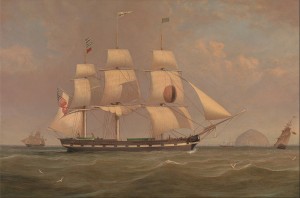 During this Fourth of July Week, I thought a little reflection on an Old Testament conundrum that connects with some American patriotic poetics would be appropriate, so here goes: A mysterious phrase crops up three times in the Old Testament that has proved to be, well, a bit unsolvable. The phrase is “from sea to sea” and shows up in these passages. (I should note however, that the early Canadians tried to co-opt this phrase themselves in their coat of arms, which includes the Latin a mari usque ad mare. 🙂 )
During this Fourth of July Week, I thought a little reflection on an Old Testament conundrum that connects with some American patriotic poetics would be appropriate, so here goes: A mysterious phrase crops up three times in the Old Testament that has proved to be, well, a bit unsolvable. The phrase is “from sea to sea” and shows up in these passages. (I should note however, that the early Canadians tried to co-opt this phrase themselves in their coat of arms, which includes the Latin a mari usque ad mare. 🙂 )
May he have dominion from sea to sea, and from the River to the ends of the earth! (Ps 72:8 ESV)
They shall wander from sea to sea, and from north to east; they shall run to and fro, to seek the word of the LORD, but they shall not find it. (Amos 8:12 ESV)
I will cut off the chariot from Ephraim and the war horse from Jerusalem; and the battle bow shall be cut off, and he shall speak peace to the nations; his rule shall be from sea to sea, and from the River to the ends of the earth. (Zech 9:10 ESV)
The trouble with this little phrase is that it seems to denote a geographical reality, but scholars have pounded their heads against the wall to figure out exactly what geographical reality we’re talking about.
Exegetical Nitpicking
It wouldn’t be right to pass over the passages and on to the dictionaries to solve the problem, so first we have to engage in a little nitpicky investigation. Notice that in the Psalm 72 and Zech 9 passages, the phrase is appended by another stock phrase “from the River to the ends of the earth.” In each of those two cases we’re talking about a messianic king reigning from Jerusalem and establishing dominion. One would expect such passages to recall the ideal borders of the Holy Land (Deut 1:5; Josh 1:3-4) and say something like “He’ll have dominion from Dan to Beersheba!” But instead, we get these other features. The only easy one to identify is “the River”, which is the Euphrates–I don’t think any scholar dissents from this view. The “ends of the earth” which could just mean “everywhere really far away” has sometimes been identified with the Atlantic exit from the Mediterranean, Gibraltar. In the Amos passage, we have something different. We’re not talking about ideal reigns or borders, but starving people roaming for food and “from sea to sea” is a convenient way of saying “helter skelter” or “higgledy-piggledy.”
The Options
Ok, so what are the options for explaining “from sea to sea”?
1. The most common sense option, from my view, is to consider one of the seas to be the Mediterranean and one to be the Indian Ocean or one of its offshoots (Persian Gulf, Red Sea). We don’t have a complete understanding of how the ancient thought about their geography, but those two HUGE bodies of water seem to be the logical choices for me.
2. One could say: Mediterranean sea to Gulf of Aqaba
3. Or: Mediterranean sea to Dead Sea.
4. BUT, the problem is those seas are actual things. “The ends of the earth” may not be. You can’t go on vacation there. Othmar Keel offers an interesting perspective in his important book Symbolism of the Bible here:
Keel uses an artifact called The Babylonian Map of the Woooooooorld (cue big voice radio guy) to show how the ancients understood their geographic position. In a GPS-free world, things can get confusing! There’s a disk of land, surrounded by a circle of water–all land being like a big island. While there’s some truth to this–continents are really just enormous islands–it makes our “sea to sea” thing a bit different. The idea here might be more to say “everywhere in the whole wide world!” which would comport with the “ends of the earth” idea our phrase is combined with in Ps 72 and Zech 9. Another scholar has examined this point and defended this view further: Magne Saebø, “Vom Grossreich zum Weltreich: Erwägnungen zu Pss 72:8, 89:26; Zech 9:10b,” Vetus Testamentum 28(1978): 83-91. Saebø digs deeper and tries to explain how an ancient formula for describing a territory using east-west, north-south terms (like we might say “coast to coast and border to border”) has now expanded to account for the entire world in a way that doesn’t exactly make sense.
To me, the last option, while not easy to arrive at is probably the best one. Perhaps more archaeological digs and research will give us more examples or clues to explain the “from sea to sea” phrase more closely. When we hear of the messianic king reigning from sea to sea, we should be thinking something like “everywhere!!”
That’s your Independence Day edition of the Catholic Bible Student. Enjoy it from sea to sea!
